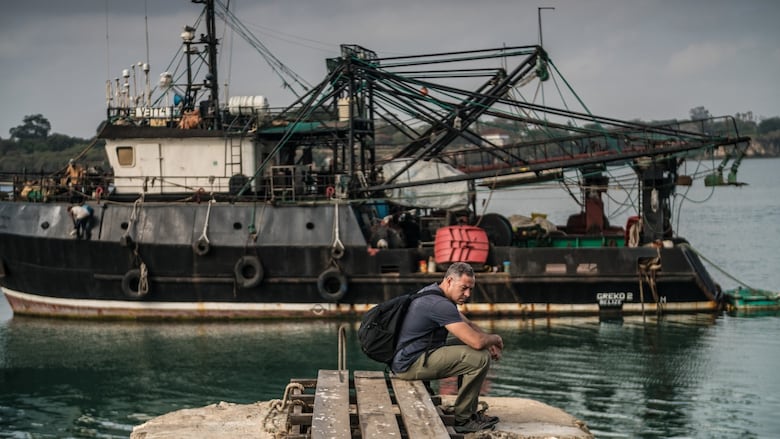Why risk it all to report on the world's oceans? For this reporter, it starts with guilt
Ian Urbina's perilous reporting for The Outlaw Ocean is fueled by a deep sense of obligation

Imagine a journalist on foreign assignment. He's on the phone with his wife back home. There's a loud knock on his hotel door. And when he answers it, a dozen or more armed men — local militia — burst into his room and demand his personal tracking device. Then the beating begins — all while his wife is still on the line.
No, this isn't a scene from a thriller. This really happened to Pulitzer Prize-winning journalist Ian Urbina while on a reporting trip in Libya. It's just one example of the real dangers he's faced to tell stories about the vast, largely lawless expanse that is the world's oceans.
Urbina recently spoke about the personal motivations behind his risky work with Daemon Fairless, story editor on season two of The Outlaw Ocean podcast and host of the Hunting Warhead podcast.

When Fairless asks why Urbina chooses to take such profound risks for his reporting, he explains that his reasons are "convoluted, dark and guilt-laden." Whenever he returns home, he's "haunted" by the thought that he's not doing enough: "The more you see, the more you feel obligated to continue trying to do the work."
And Urbina has seen some things.
In season two of his podcast, he sheds light on secretive Libyan prisons swallowing up sea-faring migrants; flagrant human rights abuses in China's massive off-shore fleet; the horrors of a shrimp processing plant in India; and more. Forced labour is also a theme across several of his investigations, and Urbina and his team uncover evidence of China using indentured Uyghur and North Korean workers.

Urbina also traces his mission back to an eye-opening report he did on sea slavery in Thailand, while still working with his former employer The New York Times.
"Five weeks of intensive reporting in that space kind of opened my eyes to a darker corner of the planet than I had ever encountered," he explains. "And I couldn't really ever go home after that, emotionally, if you will."
That reporting directly influenced his decision to quit his stable job with the Times and start his own investigative journalism non-profit, The Outlaw Ocean Project.
It's that same sense of moral obligation that fuels his willingness to confront immense dangers.
For instance, Urbina describes climbing aboard massive Chinese fishing vessels in volatile waters as "genuinely the most dangerous thing that we do at sea." One misstep could be fatal.
"You have to essentially jump from the skiff at just the right moment onto the rope ladder. If you miss, you'll fall between the skiff and the ship. And when it goes up and down, you're basically going to be pushed under water by a 20-ton piece of equipment," explains Urbina. "So you cannot miss."
Fairless wonders if such high-risk reporting is a bit "insane." Urbina responds with a chuckle and says his own family has told him he's crazy often enough that he's starting to believe it.
But the deeper truth is Urbina feels caught in a "weird, negative, almost Catholic guilt feedback loop." He describes this as the "strange fuel" that has powered his entire career.

"The world is a flawed place and you should try to fix it to the extent you can," he tells Fairless. "If you win the lottery of birth and you have the opportunity to do things, then you owe it back."
Still, Urbina admits the work takes an emotional toll. "It feels Sisyphean," he says, noting that the very issues he reports on are intensifying globally — from the outsourcing of migration control to the proliferation of forced labour at sea. But his resolve remains.
"What else are you going to do? You've got to keep pushing the boulder up the hill."
Listen to the full conversation, including more detail on Ian Urbina's recent investigations, on The Outlaw Ocean podcast feed.

